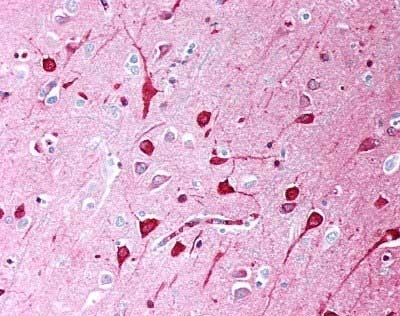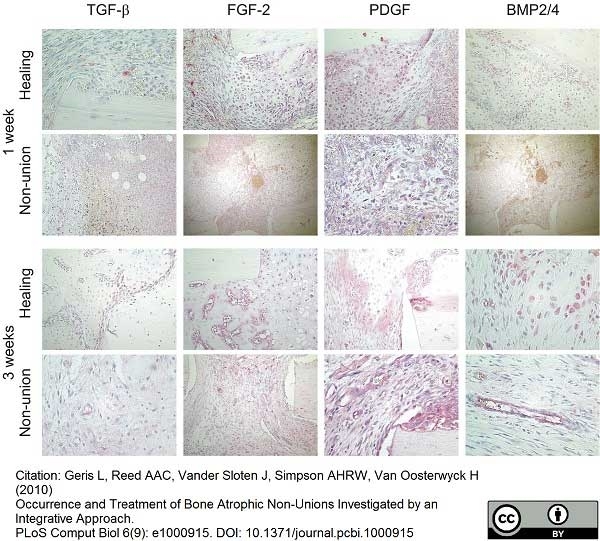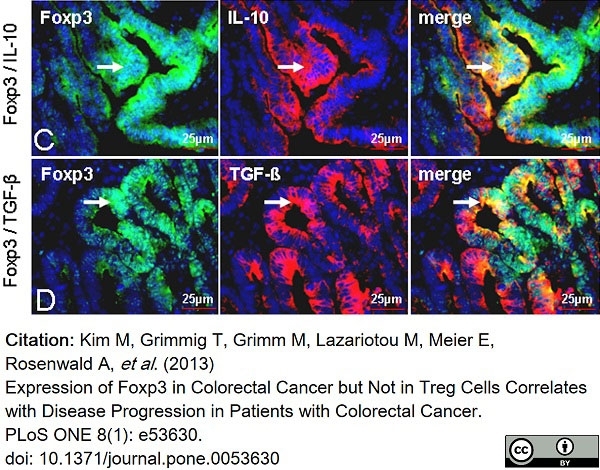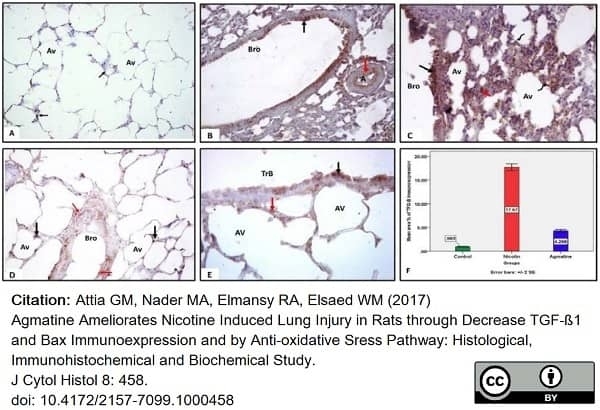TGF Beta antibody | TB21




Mouse anti Human TGF Beta
- Product Type
- Monoclonal Antibody
- Clone
- TB21
- Isotype
- IgG1
- Specificity
- TGF Beta
| Mouse anti Human TGF beta antibody, clone TB21 recognizes both human platelet-derived and recombinant TGF-beta1 in enzyme-linked immunosorbent assay (ELISA). Mouse anti Human TGF beta antibody, clone TB21 demonstrates neutralising activity against TGF-beta1 in cell proliferation assays. Mouse anti Human TGF beta antibody, clone TB21 has been demonstrated to react with dimeric (~25 kDa) or monomeric (~12.5 kDa) molecules of natural TGF-beta1 under non-reducing and reducing conditions respectively. |
- Target Species
- Human
- Species Cross-Reactivity
-
Target Species Cross Reactivity Rat Sheep Mustelid Mink Rabbit Mouse - N.B. Antibody reactivity and working conditions may vary between species.
- Product Form
- Purified IgG - liquid
- Preparation
- Purified IgG prepared by affinity chromatography from ascites
- Buffer Solution
- Phosphate buffered saline
- Preservative Stabilisers
- <0.1% Sodium Azide (NaN3)
- Immunogen
- Human Transforming Growth Factor Beta 1 from platelets.
- Approx. Protein Concentrations
- IgG concentration 1.0 mg/ml
- Fusion Partners
- Spleen cells from immunised Balb/c mice were fused with cells of the SP2/0-Ag 14 mouse myeloma cell line.
- Regulatory
- For research purposes only
- Guarantee
- 6 months from date of despatch
Avoid repeated freezing and thawing as this may denature the antibody. Storage in frost-free freezers is not recommended.
| Application Name | Verified | Min Dilution | Max Dilution |
|---|---|---|---|
| ELISA | |||
| Flow Cytometry 1 | |||
| Immunohistology - Frozen | |||
| Immunohistology - Paraffin 2 | |||
| Western Blotting |
- 1 Membrane permeabilization is required for this application. The use of Leucoperm (Product Code BUF09) is recommended for this purpose.
- 2 Mouse anti Human TGF β antibody, clone TB21 has been used successfully on FFPE tissues without pretreatment e.g. (Bob et al. 2011 and Booth et al. 2002). Others have used either citrate pH6.0, EDTA pH8.0 or pepsin mediated antigen retrieval.
- Flow Cytometry
- Use 10ul of the suggested working dilution to label 1x106 cells in 100ul
- Histology Positive Control Tissue
- Human Breast Carcinoma
| Description | Product Code | Applications | Pack Size | List Price | Your Price | Quantity | |
|---|---|---|---|---|---|---|---|
| Mouse IgG1 Negative Control | MCA928 | F | 100 Tests |
|
Log in | ||
| List Price | Your Price | ||||||
|
|
Log in | ||||||
| Description | Mouse IgG1 Negative Control | ||||||
Source Reference
-
Shi, W.K. et al. (1993) [Biological characterization of a monoclonal antibody TB 21 against human transforming growth factor-beta 1].
Shi Yan Sheng Wu Xue Bao. 26: 141-50.
References for TGF Beta antibody
-
(2011) Human Protein Atlas: CAB000361
Human Protein Atlas: CAB000361 -
Nicotina, P.A. et al. (1997) Segmental up-regulation of transforming growth factor-beta in the pathogenesis of primary megaureter. An immunocytochemical study.
Br J Urol. 80: 946-9. -
Omer, F.M. and Riley, E.M. (1998) Transforming growth factor beta production is inversely correlated with severity of murine malaria infection.
J Exp Med. 188: 39-48. -
Brown, H. et al. (1999) Cytokine expression in the brain in human cerebral malaria.
J Infect Dis. 180: 1742-6. -
Lavaud, S. et al. (2001) Inflammation is probably not a prerequisite for renal interstitial fibrosis in normoglycemic obese rats.
Am J Physiol Renal Physiol. 280: F683-94. -
Sheu, B.C. et al. (2001) Predominant Th2/Tc2 polarity of tumor-infiltrating lymphocytes in human cervical cancer.
J Immunol. 167: 2972-8. -
Fernandez, T. et al. (2002) Disruption of transforming growth factor beta signaling by a novel ligand-dependent mechanism.
J Exp Med. 195: 1247-55. -
Ueda, S. et al. (2003) Transforming growth factor-beta1 released from the spleen exerts a growth inhibitory effect on liver regeneration in rats.
Lab Invest. 83: 1595-603.
View The Latest Product References
-
Kingston, P.A. et al. (2003) Adenovirus-mediated gene transfer of transforming growth factor-beta3, but not transforming growth factor-beta1, inhibits constrictive remodeling and reduces luminal loss after coronary angioplasty.
Circulation. 108: 2819-25. -
Paalangara, R. et al. (2003) Intestinal exposure to a parasite antigen in utero depresses cellular and cytokine responses of the mucosal immune system.
Vet Immunol Immunopathol. 93: 91-105. -
Hsiao, Y.W. et al. (2004) Tumor-infiltrating lymphocyte secretion of IL-6 antagonizes tumor-derived TGF-beta 1 and restores the lymphokine-activated killing activity.
J Immunol. 172: 1508-14. -
Moussay, E. et al. (2006) Escherichia coli Shiga toxin 1 enhances il-4 transcripts in bovine ileal intraepithelial lymphocytes.
Vet Immunol Immunopathol. 113: 367-82. -
Helske, S. et al. (2006) Possible role for mast cell-derived cathepsin G in the adverse remodelling of stenotic aortic valves.
Eur Heart J. 27: 1495-504. -
Hopkinson, A. et al. (2006) Amniotic membrane for ocular surface reconstruction: donor variations and the effect of handling on TGF-beta content.
Invest Ophthalmol Vis Sci. 47: 4316-22. -
Sumpter, T.L. et al. (2007) Regulation of the NFAT pathway discriminates CD4+CD25+ regulatory T cells from CD4+CD25- helper T cells.
J Leukoc Biol. 83: 708-17. -
Buss, A. et al. (2008) TGF-beta1 and TGF-beta2 expression after traumatic human spinal cord injury.
Spinal Cord. 46: 364-71. -
Lyras, D.N. et al. (2010) Temporal and spatial expression of TGF-beta1 in an Achilles tendon section model after application of platelet-rich plasma.
Foot Ankle Surg. 16: 137-41. -
Lehr, E.J.et al. (2010) Decellularization reduces immunogenicity of sheep pulmonary artery vascular patches.
J Thorac Cardiovasc Surg. 141: 1056-62. -
Calveley, V.L. et al. (2010) Genistein can mitigate the effect of radiation on rat lung tissue.
Radiat Res. 173: 602-11. -
Mahmood, J. et al. (2011) Mitigation of lung injury after accidental exposure to radiation.
Radiat Res. 176: 770-80. -
Bob, F.R. et al. (2011) Histological changes and immunohistochemical markers in the assessment of glomerulosclerosis in patients with glomerulonephritis.
Rom J Morphol Embryol. 52: 1027-32. -
Braun, N. et al. (2011) Difference in the expression of hormone receptors and fibrotic markers in the human peritoneum--implications for therapeutic targets to prevent encapsulating peritoneal sclerosis.
Perit Dial Int. 31: 291-300. -
Westermann, D. et al. (2011) Cardiac inflammation contributes to changes in the extracellular matrix in patients with heart failure and normal ejection fraction.
Circ Heart Fail. 4: 44-52. -
Kim, M. et al. (2013) Expression of Foxp3 in colorectal cancer but not in Treg cells correlates with disease progression in patients with colorectal cancer.
PLoS One. 8 (1): e53630. -
Bob, F. et al. (2014) Immunohistochemical study of tubular epithelial cells and vascular endothelial cells in glomerulonephritis.
Ren Fail. 36: 1208-14. -
Gomaa, W.M. et al. (2014) Overexpression of cyclooxygenase-2 and transforming growth factor-beta 1 is an independent predictor of poor virological response to interferon therapy in chronic HCV genotype 4 patients.
Saudi J Gastroenterol. 20 (1): 59-65. -
Yusup, A. et al. (2015) Bone marrow lesions, subchondral bone cysts and subchondral bone attrition are associated with histological synovitis in patients with end-stage knee osteoarthritis: a cross-sectional study.
Osteoarthritis Cartilage. 23 (11): 1858-64. -
Hu, H-Y. et al. (2016) ATRA alleviated endometrial fibrosis in a rabbit intrauterine adhesions model through downregulation of the TGF-β1/smad4 signaling pathway.
Int J Clin Exp Pathol 9(6): 6171-8. -
Elkabir, M.A. et al. (2016) Efficacy of azithromycin and metronidazole combined therapy on rats' gingival overgrowth induced by cyclosporine-A: An experimental animal study.
J Oral Biol Craniofac Res. 6 (3): 219-226. -
Attia, G.M. et al. (2017) Autologous platelet rich plasma enhances satellite cells expression of MyoD and exerts angiogenic and antifibrotic effects in experimental
rat model of traumatic skeletal muscle injury
Egypt J Histol 40 (4): 443-58. -
Dagnelie, M.A. et al. (2019) Cutibacterium acnes phylotypes diversity loss: a trigger for skin inflammatory process.
J Eur Acad Dermatol Venereol. 33 (12): 2340-2348. -
Abd-Elhafez, A. et al. (2021) The possible curative role of bone marrow-derived mesenchymal stem cells in bleomycin-induced skin changes in adult male albino rats
Egyptian Journal of Histology. 45 (4): 1125-45.
- Synonyms
- Transforming Growth Factor Beta
- RRID
- AB_2201912
- UniProt
- P01137
- Entrez Gene
- TGFB1
- GO Terms
- GO:0016049 cell growth
- GO:0001933 negative regulation of protein phosphorylation
- GO:0002062 chondrocyte differentiation
- GO:0002244 hemopoietic progenitor cell differentiation
- GO:0002248 connective tissue replacement involved in inflammatory response wound healing
- GO:0002576 platelet degranulation
- GO:0005114 type II transforming growth factor beta receptor binding
- GO:0005578 proteinaceous extracellular matrix
- GO:0005615 extracellular space
- View More GO Terms
- GO:0005634 nucleus
- GO:0005796 Golgi lumen
- GO:0006611 protein export from nucleus
- GO:0006754 ATP biosynthetic process
- GO:0006917 induction of apoptosis
- GO:0007050 cell cycle arrest
- GO:0007173 epidermal growth factor receptor signaling pathway
- GO:0007179 transforming growth factor beta receptor signaling pathway
- GO:0007183 SMAD protein complex assembly
- GO:0007184 SMAD protein import into nucleus
- GO:0007435 salivary gland morphogenesis
- GO:0048535 lymph node development
- GO:0008083 growth factor activity
- GO:0008156 negative regulation of DNA replication
- GO:0010718 positive regulation of epithelial to mesenchymal transition
- GO:0010742 macrophage derived foam cell differentiation
- GO:0010763 positive regulation of fibroblast migration
- GO:0010800 positive regulation of peptidyl-threonine phosphorylation
- GO:0010862 positive regulation of pathway-restricted SMAD protein phosphorylation
- GO:0016202 regulation of striated muscle tissue development
- GO:0016563 transcription activator activity
- GO:0017015 regulation of transforming growth factor beta receptor signaling pathway
- GO:0019049 evasion of host defenses by virus
- GO:0019058 viral infectious cycle
- GO:0022408 negative regulation of cell-cell adhesion
- GO:0030168 platelet activation
- GO:0030308 negative regulation of cell growth
- GO:0030501 positive regulation of bone mineralization
- GO:0031093 platelet alpha granule lumen
- GO:0031575 mitotic cell cycle G1/S transition checkpoint
- GO:0032355 response to estradiol stimulus
- GO:0032570 response to progesterone stimulus
- GO:0032740 positive regulation of interleukin-17 production
- GO:0032801 receptor catabolic process
- GO:0032967 positive regulation of collagen biosynthetic process
- GO:0033138 positive regulation of peptidyl-serine phosphorylation
- GO:0035307 positive regulation of protein dephosphorylation
- GO:0043406 positive regulation of MAP kinase activity
- GO:0043536 positive regulation of blood vessel endothelial cell migration
- GO:0043537 negative regulation of blood vessel endothelial cell migration
- GO:0043552 positive regulation of phosphatidylinositol 3-kinase activity
- GO:0043932 ossification involved in bone remodeling
- GO:0045216 cell-cell junction organization
- GO:0045599 negative regulation of fat cell differentiation
- GO:0045930 negative regulation of mitotic cell cycle
- GO:0046732 active induction of host immune response by virus
- GO:0048298 positive regulation of isotype switching to IgA isotypes
- GO:0050680 negative regulation of epithelial cell proliferation
- GO:0050714 positive regulation of protein secretion
- GO:0050921 positive regulation of chemotaxis
- GO:0051781 positive regulation of cell division
- GO:0051897 positive regulation of protein kinase B signaling cascade
- GO:0060389 pathway-restricted SMAD protein phosphorylation
- GO:0060391 positive regulation of SMAD protein import into nucleus
- GO:0070723 response to cholesterol
Please Note: All Products are "FOR RESEARCH PURPOSES ONLY"
View all Anti-Human ProductsAlways be the first to know.
When we launch new products and resources to help you achieve more in the lab.
Yes, sign me up


